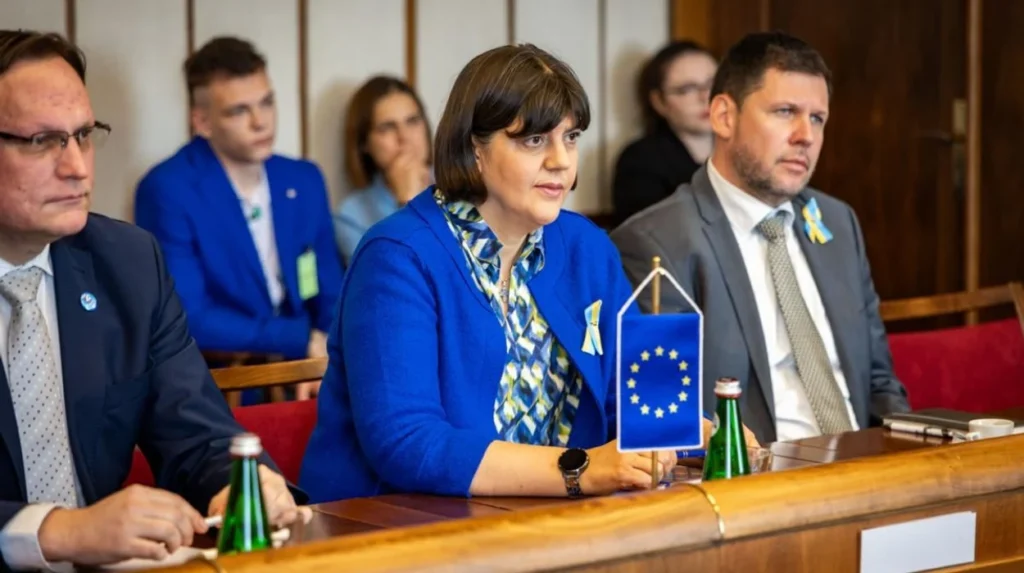Slovakia has emerged as a significant transit hub for criminal money flows, particularly linked to large-scale VAT and customs fraud within the European Union. Key political figures and the European Public Prosecutor’s Office have highlighted systemic issues in enforcement and legislation that enable this trend, with broad implications for the country’s governance and economy.
Slovakia’s Role in Criminal Money Flows
Slovakia has notably become a major transit point for criminal money flows within the European Union, functioning as an important hub where significant illegal financial activities are channeled. The European Public Prosecutor’s Office (EPPO) has underlined the country’s increasing involvement in criminal money laundering, especially related to value-added tax (VAT) and customs fraud, which constitute the bulk of these illicit activities.
As reported by Laura Codruța Kövesi, chief European prosecutor, in her visit to Slovakia on 11 November 2025, the country is now identified as a “paradise for tax fraudsters” and a central arena for VAT and customs fraud within the EU. She underscored the urgent need for systemic change to combat this growing problem.
High-Level Political Reactions
The issue has drawn considerable attention from both government officials and opposition politicians in Slovakia. Marián Viskupič, deputy chairman of the opposition party SaS, criticised Prime Minister Robert Fico’s administration for turning Slovakia into a “laundry for European money,” emphasising that every third case of VAT fraud investigated by the EPPO is linked to Slovakia. Viskupič expressed outrage over the fact that such large-scale frauds are taking place domestically, necessitating intervention from the European Central Prosecutor’s Office.
Opposition leader Michal Šimečka of Progressive Slovakia labelled the situation as an indictment of 15 years of governance under Robert Fico’s leadership, pointing to the country’s disproportionate involvement in VAT fraud cases relative to its size. Šimečka highlighted the complexities of the Slovak tax system, including excessive exemptions and new taxes such as the transaction tax, which he claims hinder economic growth and contribute to the problem.
Similarly, Veronika Remišová, from the political movement Hnutie Slovensko – Za ľudí, confirmed a collapse in the justice system, linking Slovakia’s status as a VAT fraud hub to amendments in criminal law aimed at protecting criminal interests and dismantling elite police and prosecution units fighting organised crime.
Scope and Impact of Fraud in Slovakia
According to the EPPO, approximately one-third of all VAT and customs fraud cases it investigates in the EU involve Slovakia, resulting in estimated losses amounting to around €900 million. The persistence of these criminal networks is linked to weakened regulations and enforcement failures, which have created an enabling environment for fraudulent activities.
This persistent trend impacts Slovakia’s financial administration and economic landscape, draining critical public resources and undermining the credibility of governance. The countries neighboring Slovakia have reportedly tightened their border controls in response to increased criminal activities, particularly smuggling and trafficking facilitated by criminal groups operating within Slovakia.
Broader Criminal Networks and Activities
Beyond VAT fraud, Slovakia faces challenges from layered criminal networks that engage in diverse illicit activities, including drug trafficking, human smuggling, and organised crime. Recent reports from international crime indexes and analysts point to Slovakia’s geographic position as a key transit point for heroin shipments originating from Afghanistan, as well as for cocaine and methamphetamine trafficked by Balkan-based organised crime groups.
Additionally, criminal groups from neighboring countries such as Hungary, Romania, Poland, and the Czech Republic are active in Slovakia, often coordinating large-scale thefts, drug distribution, and other illicit operations. Geopolitical factors further complicate the situation, with suspected cooperation between Russian entities and Italian mafia groups such as the ‘Ndrangheta facilitating organized crime activities within Slovakia’s borders.
Institutional and Legislative Challenges
Slovakia has developed anti-money laundering frameworks involving institutions like the Financial Intelligence Unit and the National Bank of Slovakia. Nevertheless, enforcement remains a critical problem, with gaps in tracing illicit financial flows and recent legislative changes seen by critics as weakening penalties for financial crimes. These developments may inadvertently make Slovakia a more attractive destination for laundering money through real estate, offshore accounts, and cryptocurrencies.
The dismantling of specialised police and prosecution units devoted to fighting fraud and organised crime has exacerbated the problem. Opposition figures and European officials alike stress that rebuilding these capacities and revising legal frameworks are essential steps to reversing Slovakia’s current trajectory as a major transit hub for criminal finances.
Calls for Reform and Action
Calls for immediate reform come amid warnings that Slovakia’s current approach risks further entrenching criminal interests in the country’s economic and political systems. The European Public Prosecutor’s Office and domestic opposition leaders urge the Slovak government to strengthen legal frameworks, restore elite anti-fraud and anti-corruption law enforcement units, and remove legislative obstacles that favour criminal activities.
Marián Viskupič insists Slovakia must no longer serve as a European laundering centre, emphasising the need for government accountability to restore public trust and fiscal integrity. The consensus among observers is that without decisive action, Slovakia could continue to lose valuable financial resources and its reputation within the EU.







